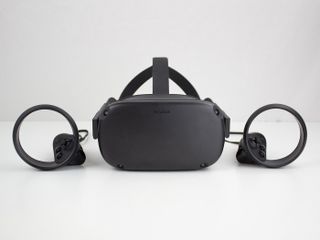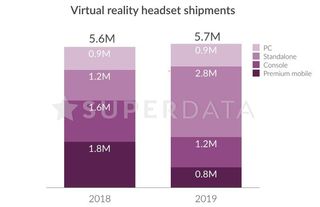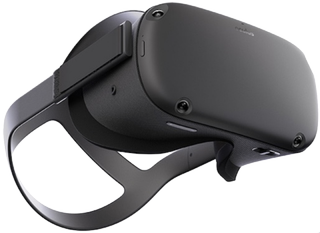Nearly half of all VR headsets sold in 2019 was an Oculus Quest

What you need to know
- Standalone VR headsets, like the Oculus Quest, accounted for 49% of all VR headset sales in 2019.
- PC VR headset shipments shrank 8% year-over-year, despite cheaper headsets coming onto the market.
- VR game revenues rose 41%, mainly thanks to the Oculus Quest.
2019 was VR's biggest year yet, and it's mainly thanks to Facebook's excellent Oculus Quest. Ever since its launch on May 21, 2019, the "VR console" has sold incredibly well, and Facebook has stated several times that the Oculus Quest is selling as fast as Facebook can make it. While some have argued that Facebook is arbitrarily holding back stock of the standalone VR system to create artificial demand (it's currently on backorder everywhere), the year-in-review from SuperData, a Nielson Company, show that 49% of all VR headsets sold in 2019 were standalone VR headsets like the Oculus Quest.

But it's not just the number of units shipped or sold that's impressive. The amount of money going to developers of VR games on the Oculus Quest was so great that it increased VR gaming revenues 41% when compared to the industry at large in 2018. To put that in perspective, consumers spent a total of $171 million on standalone VR games during the year. By comparison, PC VR games only accounted for a total of $86 million in 2019. That means game sales from brand new headsets like the Oculus Quest were double that of established PC VR headsets that have been around for years. The sales of PC VR hardware matches up with this, and actually showed an 8% decline when compared to 2018.
Every game confirmed for Oculus Quest
While hardware sales only grew a modest 4% year-over-year, that was done in a year where there were few blockbuster titles released. Many of the best-selling titles available on the newly released Oculus Quest, like Beat Saber, were ports of existing PC VR titles that made their PC or console VR debuts in 2018. 2020 is looking to be an even more landmark year for VR as heavy-hitters like Half-Life: Alyx make their debut, and Oculus studios is working to create additional first-party development studios, likely to rival what's available from competitors like Sony.
While the next-generation PlayStation VR (PSVR) is likely still a ways out, Sony has confirmed that the existing PSVR will work on the upcoming PlayStation 5, which is launching at the end of this year. Console VR continued to do well in 2019 as well, accounting for 1.2 million of the total 5.7 million in VR hardware sales. Given that Sony is, once again, skipping the annual E3 games show, we expect it to hold at least one event discussing new VR content on the PS4 and PS5 sometime this year. For now, though, it's clear that one thing is for certain: VR is here to stay.

Easy to play
There's nothing in your way when you game on the Oculus Quest, the world's first true standalone VR console with roomscale support and motion-tracked controllers.
Be an expert in 5 minutes
Get the latest news from Android Central, your trusted companion in the world of Android

